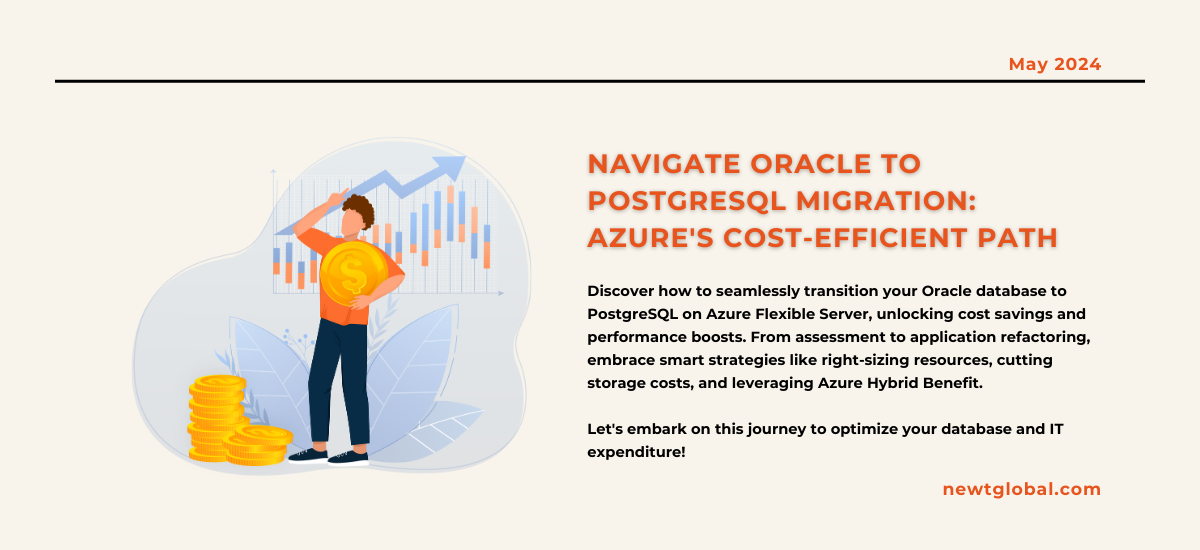
Are you thinking about moving your Oracle database to PostgreSQL on Azure Flexible Server to save money? You’re in the right place! This easy-to-read guide is all about helping you move your database smoothly without spending too much money or sacrificing performance.
Moving from Oracle to PostgreSQL on Azure has lots of perks like lower costs, better performance, and more flexibility. But, to do it right, you need a good plan and careful execution. Azure’s powerful platform and some smart strategies can make your move smooth and take full advantage of PostgreSQL’s cool features.
Imagine cutting down on storage costs, picking the right size for your needs, and using Azure Hybrid Benefit to greatly reduce your total costs. With automatic migration and careful monitoring, you can make the move efficiently, avoid problems, and open up new chances to improve and grow on Azure Flexible Server.
Don’t miss this opportunity to update your database system. Dive into our easy guide for all the tips and step-by-step advice you need to switch from Oracle to PostgreSQL on Azure Flexible Server. Let’s start this exciting journey together!
Understanding the Migration Process:
Before we get into saving money, let’s look at what it takes to move your database. This usually includes:
-
- Assessment: Check your current Oracle database to see how it’s set up and how it performs.
- Schema Conversion: Change your database layout from Oracle to something PostgreSQL can work with, making sure everything will run smoothly.
- Data Migration: Move your data from Oracle to PostgreSQL carefully to avoid downtime and keep your data consistent.
- Application Refactoring: Update your applications to work well with PostgreSQL, fixing any issues that come up.
- Testing and Validation: Test everything to make sure your database and applications are running as expected.
Cost-Effective Strategies:
-
- Right-Sizing Resources:
Before you move, figure out exactly what you need. Use tools like Azure Advisor or Azure Cost Management to understand your Oracle database’s needs. Look at how much CPU, memory, and data you’re using to figure out what you’ll need on Azure.
Choose the right size for your Azure resources to avoid paying for more than you need. And remember, Azure lets you adjust your resources based on how much you’re actually using, which can save you money over time.
-
- Cutting Storage Costs:
Storage can get expensive, so it’s important to use it wisely. Think about using Azure Blob Storage or Azure Files for things like backups and archives instead of more expensive options. You can also use PostgreSQL’s compression features to reduce how much storage you need without losing access to your data.
-
- Using Data Compression:
PostgreSQL has great features for compressing your data, which can save you a lot of storage space and money. Techniques like TOAST help shrink down large pieces of data automatically. And for even more savings, look into partitioning your data or using columnar storage, which can also make your database faster.
-
- Taking Advantage of Azure Hybrid Benefit:
If you already have Oracle licenses, Azure Hybrid Benefit can help you save money on Azure. This program lets you use your existing licenses to get discounts on Azure services. It’s a great way to make your move to PostgreSQL more affordable.
-
- Automating Migration Processes:
Using Azure’s tools to automate your move can save you time and avoid mistakes. Services like Azure Database Migration Service make it easier to move your schema and data with little downtime. And tools like Azure Resource Manager templates can help set up your Azure resources quickly and correctly.
-
- Opting for Reserved Instances:
If you know how much resource you’ll need in advance, buying reserved instances can save you a lot of money. Azure offers discounts for these long-term commitments, which can make your ongoing costs much lower.
-
- Monitoring and Optimization:
After you move, keep monitoring your PostgreSQL database to make sure you’re using resources efficiently. Azure has tools to help you track performance and costs, so you can adjust as needed to keep things running smoothly and affordably.
Conclusion:
Migrating Oracle databases to PostgreSQL on Azure Flexible Server can deliver significant cost savings and performance improvements for organizations. By adopting cost-effective strategies such as right-sizing resources, optimizing storage, leveraging Azure Hybrid Benefit, and automating migration processes, organizations can minimize costs while ensuring a seamless migration experience. With careful planning, execution, and ongoing optimization, migrating to PostgreSQL on Azure Flexible Server can unlock new opportunities for innovation and growth while optimizing IT expenditure.
Ready to unlock significant cost savings and performance improvements by migrating your Oracle databases to PostgreSQL on Azure Flexible Server? Contact Newt Global at marketing@newtglobalcorp.com or visit our website at newtglobal.com to learn more about how Newt Global DMAP can accelerate your migration process.
Newt Global DMAP is a world-class product enabling mass migration of Oracle Db to cloud-native PostgreSQL faster, better, and cheaper. Don’t miss out on the opportunity to optimize your IT expenditure and drive innovation with seamless database migration on Azure.
